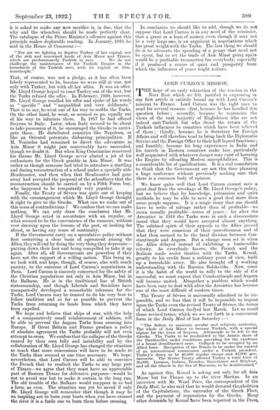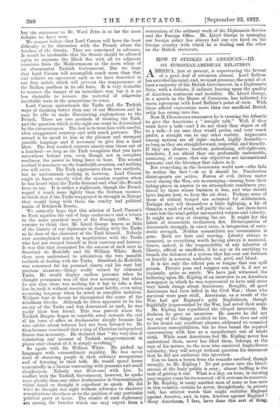LORD CURZON'S MISSION. T HE hope of an early relaxation of
the tension in the Near East which we ftlt justified in expressing in our first article is entirely bound up with Lord Curzon's mission to France. Lord Curzon was the right man to send for several reasons—first, because he has handled this question before ; secondly, because he represents the views of the vast majority of Englishmen who are not indeed anti-Turkish but who dread the return of the Turkish influences to countries which have been relieved of them ; thirdly, because he is Secretary for Foreign Affairs and will therefore tend to bring back the Diplomatic Service and the Foreign Office to their half-lapsed functions ; and. fourthly, because his long experiences in India and his travels in Eastern countries make him particularly well acquainted with whatever danger may exist of harming the Empire by offending Moslem susceptibilities. This is a considerable list of qualifications. It is a real consolation to think that the Government are not this time planning a huge conference without previously making sure that there is a common body of opinion.
We know quite well that Lord Curzon cannot save a great deal from the wreckage of Mr. Lloyd George's policy, but we believe that by knowledge, persuasion and quiet methods he may be able to save a good deal more than some people suppose. It is a tragic irony that one should have to write- of salvage rather than of profitable—we mean morally profitable—terms of peace ; for after the Armistice in 1918 the Turks were in such a disconsolate mood that they would have accepted almost anything. The subdued spirit of their appeals to the Allies proved that they were conscious of their powerlessness and of what then seemed to be the fatal division between Con- stantinople and Angora. But a change soon set in when the Allies delayed instead of exhibiting a businesslike celerity. As everybody knows, the French and the Italians made secret treaties with the Turks. Kemal, greatly to his credit from a military point of view, built up a formidable army. He also brought off a working understanding with the Russian Bolsheviks. Now, since it is the habit of the world to rally to the side of the successful, we must expect that Constantinople and Angora will become united. Altogether a problem which would have been easy to deal with after the Armistice has become one of the most difficult of modern times.
The Treaty of Sevres is universally admitted to be im- possible, and we fear that it will be impossible to impose upon the Turks even the revised Treaty of Sevres, the terms of which Lord Curzon drafted last March. Let us recall those revised terms, which we see set forth in a convenient form in the Daily Mail of last Saturday :— "The Sultan to maintain secular and religious authority. The whole of Asia Minor to become Turkish, with a special regime for the town of Smyrna. Adrianople to be left to the Greeks. The Turks to be readmitted to the Asiatic shore of the Dardanelles under conditions providing for the existence of a broad demilitarized zone. Gallipoli to be occupied by an Allied force. Navigation of the Straits to be under the control of an international commission under a Turkish president. Turkey's Army to be 40,000 regular troops and 45,000 gen- darmerie. The Sevres Treaty allowed Turkey a total force of 50,000. Lemnos, Imbros, Tenedos, Samothrace and Mitylene, and all the islands in the Sea of Marmora, to be demilitarized."
As against this, Kemal is asking not only for all Asia Minor but for Thrace up to the river Maritza. In an interview with Mr. Ward Price, the correspondent of the Daily Mail, he also said that he would demand the.abolition of the Capitulations, the surrender of the Greek Fleet, and the payment of reparations by the Greeks. Many other demands by Kemal tave been reported in the Press, but the statement to Mr. Ward Price is so far the most definite we have seen.
We cannot believe that Lord Curzon will have the least difficulty in his discussion with the French about the freedom of the Straits. They are convinced in advance.
It would be intolerable that the Straits should be allowed again to separate the Black Sea with all its adjacent countries from the Mediterranean at the mere whim of en obscurantist Turkish Government. But we hope t hat Lord Curzon will accomplish much more than that and achieve an agreement such as we have described in our first article which will prevent the reappearance of the Balkan problem in its old form. It is very desirable to remove the danger of an immediate war, but it is no less desirable to remove the material of otherwise inevitable wars in the generations to come.
Lord Curzon understands the Turks and the Turkish ways of thinking better than any of our Ministers and he may be able to make illuminating explanations to the French. There are two methods of treating the Turk, and the question which is the right one must be determined by the circumstances. The first is to treat him with careful, even exaggerated courtesy and with much patience. The second is to speak to him in the plainest and strongest possible language and if necessary to give him a hard blow. The first method answers ninety-nine times out of a hundred—so long as the Turk recognizes that you have somewhere behind you, even though not in complete readiness, the power to bring force to bear. The second method is necessary on the hundredth occasion, and nothing else will serve. The Turk appreciates these two methods, but he understands nothing in between. Lord Curzon ought to know exactly what the occasion requires when he has heard what the Turks demand and what the French have to say. It is rather a nightmare, though the French regard it much more lightly than the German menace, to think that if the Turks reappeared in strength in Europe they would bring with them the cruelty and political mania of Bolshevik Russia.
We earnestly hope that this mission of Lord Curzon's to Paris signifies the end of huge conferences and a return to the more practical ways of the Foreign Office. We venture to think that Mr. Lloyd George knows as little of the history of our diplomats in dealing with the Turks as he does of the character of the Turk himself. Nobody ever accomplished much in negotiations with the Turks who had not steeped himself in their customs and history.
It was this that accounted for the success of such men as Stratford de Redcliffe and Sir William White. Both these men understood to admiration the two possible methods of dealing with the Turks. Stratford de Redcliffe was renowned for his personal charm and his easy but gracious manners—things really valued by educated Turks. He would display endless patience when he thought persuasion was all that was necessary, but when he saw that there was nothing for it but to take a firm Line he took it without reserve and most boldly, even using menacing language when he acted in complete isolation. Without fear or favour he championed the cause of the rebellious Greeks. Although he often appeared to be the enemy of the Turks and was denounced as such, he was really their best friend. This was proved when the Turkish Empire began to crurhble away towards the end of his term of office as Ambassador simply because his wise advice about reforms had not been listened to. He then became convinced that a ring of Christian independent States was necessary. He declared that "the very idea of reinstating any amount of Turkish misgovernment in places once cleared of it is simply revolting." So again with Sir William White. He picked up languages with extraordinary rapidity. He was never tired of observing people in their ordinary occupations and of listening to their talk. He would spend hours contentedly in a bazaar conversing with peasants and small shopkeepers. Nobody was ill-at-ease with him. In conflict with the Turkish Government, however, he spoke more plainly than any other Ambassador in Constantinople either dared or thought it expedient to speak. He did what he thought was right without reference to shadowy complications elsewhere or to the position of any particular political party at home. The results of such diplomacy are among the benefits which one may expect from a restoration of the ordinary work of the Diplomatic Service and the Foreign Office. Mr. Lloyd George in managing our foreign policy has always had one eye fixed on the foreign country with which he is dealing and the other on the British electorate.



































 Previous page
Previous page